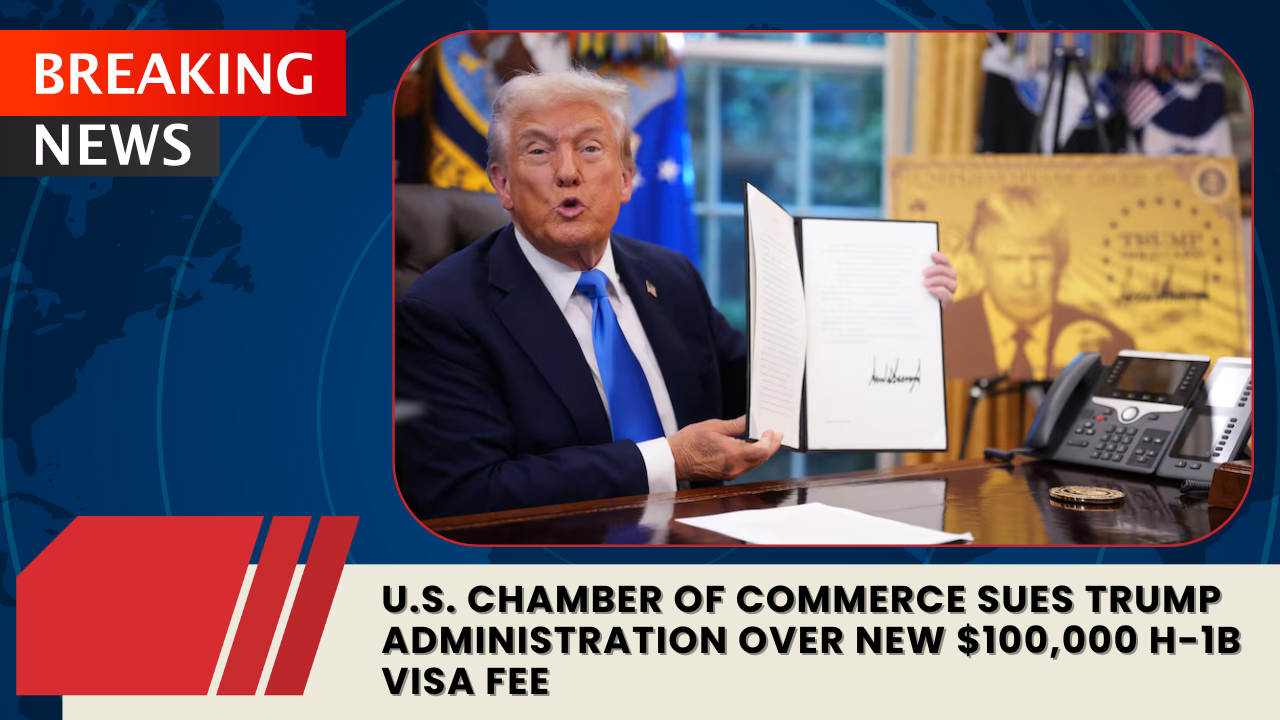The U.S. Chamber of Commerce, the country’s largest business lobbying organization, has filed a federal lawsuit challenging President Donald Trump’s new $100,000 fee on H-1B visas, arguing that the move exceeds presidential authority and threatens America’s high-skilled labor market.
A Historic Legal Challenge
Filed in Washington, D.C. federal court, this marks the first lawsuit by the Chamber against the Trump administration since the president’s return to office for a second term in January. The organization represents over 300,000 businesses across industries and says the visa fee would disrupt a system Congress created to support U.S. innovation and workforce growth.
In its complaint, the Chamber argues that Trump’s September executive proclamation—which imposed a $100,000 charge on new H-1B visa applications—violates constitutional limits by imposing financial restrictions beyond his legal authority.
“This order forces companies to either absorb exorbitant costs or abandon access to top global talent,” the Chamber said, calling the policy “an unprecedented economic barrier to competitiveness.”
Impact on Businesses and the Economy
The H-1B visa program allows U.S. employers to hire highly skilled foreign professionals—especially in science, technology, engineering, and mathematics (STEM) fields—when qualified American candidates are unavailable. It allocates 65,000 visas annually, with an additional 20,000 visas reserved for workers holding advanced degrees.
The Chamber said the new fee would impose massive financial burdens, pushing companies to scale back recruitment or eliminate roles altogether.
“Many members of the U.S. Chamber are bracing for the need to scale back or entirely walk away from the H-1B program,” the lawsuit reads. “This harms not only their investors and customers but also their existing U.S. employees.”
Currently, employers pay $2,000–$5,000 in government fees per H-1B application, depending on company size and circumstances. The Chamber noted that most petitions cost less than $3,600—a fraction of the newly mandated payment.
What Trump’s Order Does
Under the proclamation, employers sponsoring H-1B applicants must now pay an additional $100,000 before those workers can enter the United States. The rule applies to visa applicants selected in the March lottery cycle, effectively raising the total cost of sponsorship to well over six figures per worker.
The administration argues that the move will “protect American workers” from being replaced by cheaper foreign labor, claiming that large-scale dependence on visa holders undermines national and economic security. Trump cited federal immigration authority to justify the measure, describing it as necessary to safeguard domestic jobs.
However, legal experts and business leaders contend that the president’s power to restrict entry does not include imposing new financial obligations on private employers.
Broader Legal Pushback
The Chamber’s suit is not the only legal challenge. Labor unions, employer groups, and religious organizations have filed separate lawsuits in California, also claiming the rule violates both immigration and administrative law.
Critics of the H-1B system have long alleged that it enables companies to undercut U.S. wages, while supporters—including major tech firms—insist it’s essential for filling gaps in America’s shrinking STEM workforce.
The Chamber’s filing warns that without access to global talent, U.S. companies could lose their competitive edge to foreign rivals, slowing innovation and economic growth.
Industry Reaction
Industry leaders in technology, engineering, and healthcare have condemned the new rule, calling it “a tax on innovation.” Many warn that the measure could drive talent abroad, particularly to Canada and the European Union, where immigration frameworks are more business-friendly.
A Silicon Valley executive familiar with the H-1B process said, “Forcing companies to pay $100,000 per visa effectively kills hiring flexibility. Startups and mid-size tech firms can’t absorb that kind of expense.”
The Legal Path Ahead
The lawsuit calls on the federal court to block enforcement of the fee and declare Trump’s order unlawful. Legal observers expect the case to move quickly due to the economic implications for employers who plan to file H-1B applications in the 2026 fiscal cycle.
As of Thursday evening, the White House had not commented on the litigation.
What’s Next
If the courts strike down the order, it could reaffirm limits on executive immigration powers and restore the traditional visa system managed by Congress. But if the rule survives, it may redefine the cost structure for foreign hiring and reshape U.S. labor markets for years to come.
For now, businesses across the country are left in limbo—waiting to see whether America’s pathway for high-skilled immigration will remain open or be priced out of reach.



